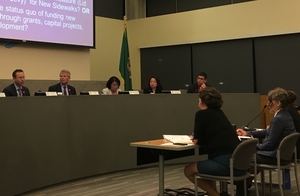Successful staff interaction in local government meetings

© Shoreline Washington City Council 2017.
Staff interaction in local government meetings can be effective or disastrous. Here are a few suggestions on how to structure successful staff interaction. We welcome your further insights—write to us here.
Not enough staff interaction
Sometimes we have observed staff who are too cautious at their council or committee meetings. They see themselves in a subordinate position and feel that their comments are welcome only when requested.
We believe that in a healthy jurisdiction, staff members are empowered to speak up on occasion. For example:
- Elected or appointed officials are about to do something illegal, like making a decision in an executive session that must be made openly.
- Councilmembers are not aware of information relevant to their discussion, or past actions that have an immediate bearing on the course of action they are considering.
- Councilmembers are breaking their own guidelines by speaking directly to each other instead of addressing remarks to the chair.
You can make this permission formal by adopting a special rule of order that authorizes staff to make a Point of Order. Alternately, you can have an informal understanding with your staff that they should speak up in these circumstances. Read about Point of Order here and special rules of order here.
In any case, it is critical that the chair and the councilmembers display the emotional maturity to accept comments from staff, and not punish them for speaking up.
Too much staff interaction
We’ve observed the opposite problem too. Sometimes staff speak up whenever they wish, and argue with the councilmembers as if they were on an equal footing. Staff must respect the fact that they support the local government officials but are not the decision-makers. This requires some delicacy on their part and a healthy humility about their role.
Another problem can occur when a single councilmember has a whole series of questions for a staff member, and the two people engage in a back-and-forth conversation that basically hijacks the meeting. This should not happen.
How to structure staff interaction?
We recommend this structure for successful staff interaction:
- Staff presents the proposed action in writing and explains it.
- Members of the body offer any questions to the staff, with each person having the opportunity to ask one or two questions in turn, for as many rounds as are necessary.
- Public comment is taken (if that is your process).
- The motion is moved and seconded.
- Councilmembers discuss the motion. During discussion, they may ask the chair for permission to address a further question to a staff member if they feel the need.
- This is the time to offer any amendments if desired.
- After discussion, the council or committee votes on the motion.
One more point about staff interaction
It’s important to remember that the official/staff member relationship is an unequal and hierarchical one. Local government officials and staff members stand in a very different relationship to their leaders. An elected or appointed body is autonomous, within the limits of law and regulation. Staff members are employees, dependent on their employer, who is responsible for their performance.
It is crucial for officials and citizen volunteers to remember this distinction. They must respect the lines of authority and the employment conditions prevailing in their jurisdiction. Council and commission members must always speak with courtesy to staff, and not criticize or berate them in public. If they have concerns, they must raise them in the proper channels. For example, a councilmember with an issue might say to the city manager, “Please set up a time to meet with me so we can follow up on this matter.”
What is your experience? Please share your thoughts on this significant topic with us. We welcome your comments!

